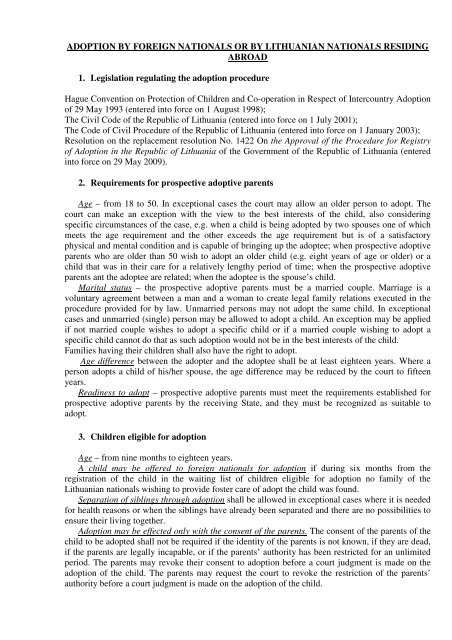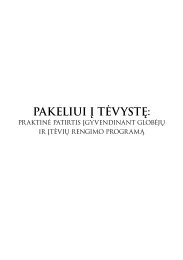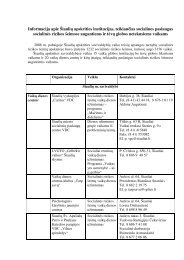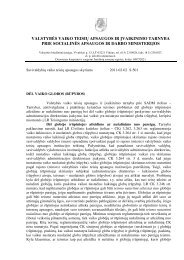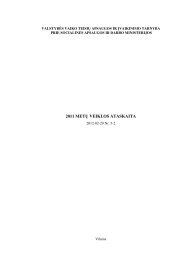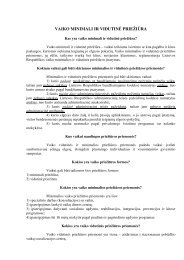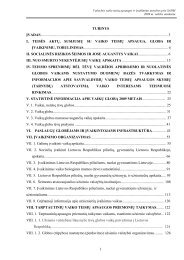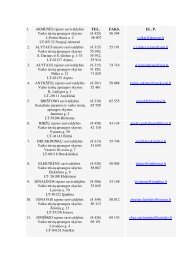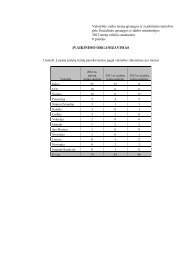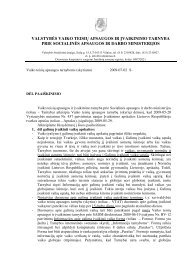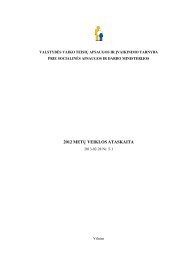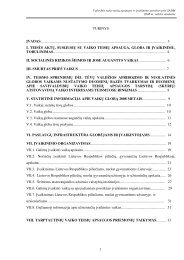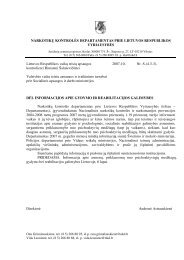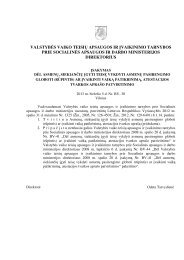ADOPTION BY FOREIGN NATIONALS OR BY LITHUANIAN ...
ADOPTION BY FOREIGN NATIONALS OR BY LITHUANIAN ...
ADOPTION BY FOREIGN NATIONALS OR BY LITHUANIAN ...
You also want an ePaper? Increase the reach of your titles
YUMPU automatically turns print PDFs into web optimized ePapers that Google loves.
<strong>ADOPTION</strong> <strong>BY</strong> <strong>F<strong>OR</strong>EIGN</strong> <strong>NATIONALS</strong> <strong>OR</strong> <strong>BY</strong> <strong>LITHUANIAN</strong> <strong>NATIONALS</strong> RESIDINGABROAD1. Legislation regulating the adoption procedureHague Convention on Protection of Children and Co-operation in Respect of Intercountry Adoptionof 29 May 1993 (entered into force on 1 August 1998);The Civil Code of the Republic of Lithuania (entered into force on 1 July 2001);The Code of Civil Procedure of the Republic of Lithuania (entered into force on 1 January 2003);Resolution on the replacement resolution No. 1422 On the Approval of the Procedure for Registryof Adoption in the Republic of Lithuania of the Government of the Republic of Lithuania (enteredinto force on 29 May 2009).2. Requirements for prospective adoptive parentsAge – from 18 to 50. In exceptional cases the court may allow an older person to adopt. Thecourt can make an exception with the view to the best interests of the child, also consideringspecific circumstances of the case, e.g. when a child is being adopted by two spouses one of whichmeets the age requirement and the other exceeds the age requirement but is of a satisfactoryphysical and mental condition and is capable of bringing up the adoptee; when prospective adoptiveparents who are older than 50 wish to adopt an older child (e.g. eight years of age or older) or achild that was in their care for a relatively lengthy period of time; when the prospective adoptiveparents ant the adoptee are related; when the adoptee is the spouse’s child.Marital status – the prospective adoptive parents must be a married couple. Marriage is avoluntary agreement between a man and a woman to create legal family relations executed in theprocedure provided for by law. Unmarried persons may not adopt the same child. In exceptionalcases and unmarried (single) person may be allowed to adopt a child. An exception may be appliedif not married couple wishes to adopt a specific child or if a married couple wishing to adopt aspecific child cannot do that as such adoption would not be in the best interests of the child.Families having their children shall also have the right to adopt.Age difference between the adopter and the adoptee shall be at least eighteen years. Where aperson adopts a child of his/her spouse, the age difference may be reduced by the court to fifteenyears.Readiness to adopt – prospective adoptive parents must meet the requirements established forprospective adoptive parents by the receiving State, and they must be recognized as suitable toadopt.3. Children eligible for adoptionAge – from nine months to eighteen years.A child may be offered to foreign nationals for adoption if during six months from theregistration of the child in the waiting list of children eligible for adoption no family of theLithuanian nationals wishing to provide foster care of adopt the child was found.Separation of siblings through adoption shall be allowed in exceptional cases where it is neededfor health reasons or when the siblings have already been separated and there are no possibilities toensure their living together.Adoption may be effected only with the consent of the parents. The consent of the parents of thechild to be adopted shall not be required if the identity of the parents is not known, if they are dead,if the parents are legally incapable, or if the parents’ authority has been restricted for an unlimitedperiod. The parents may revoke their consent to adoption before a court judgment is made on theadoption of the child. The parents may request the court to revoke the restriction of the parents’authority before a court judgment is made on the adoption of the child.
2The consent of the child – when the child to be adopted has already reached the age of 10, thechild’s consent for the adoption filled with the court shall be required. Where the child is under 10,the court must take account of the child’s will if the child is capable of expressing his/her views andif that will is not contrary to the child’s interests.Special needs children – are children children with serious or incurable medical condition, which is certified by a healthcertificate issued by a medical institution and a certificate filled in by the child’sguardian; children older than 8 years of age; who come in a sibling group of at least three who are referred for adoption together; children close to their siblings who do not agree to be adopted or who can not beadopted together.Currently, the majority of children eligible for adoption by foreign nationals are children withspecial needs. The Adoption Service encourages competent authorities of all receiving States toprovide training for families that can adopt such children. Special needs children adoptionprogramme is implemented in co-operation with accredited adoption agencies involved in findingfamilies, providing information and training as well as post-adoption services for them.4. Documents required for adoptionHague Convention on Protection of Children and Co-operation in Respect of IntercountryAdoption provides that a family must apply to a central authority or an accredited agency of thefamily’s habitual residence with an application for adoption. An accredited adoption agency mustbe authorized to act in the field of adoption by the receiving State and by the competent authoritiesof the Republic of Lithuania.All documents of prospective adoptive parents must be submitted to the State Child RightsProtection and Adoption Service; the latter shall verify whether the prospective adoptive parentsmeet the requirements and the family shall be included into the waiting list of prospective adoptiveparents. The mere fact that the family included into the waiting list of prospective adoptive parentsshall not mean that one or more children must be placed for adoption with that family. The finaljudgment regarding adoption shall be made by the court.Submission of documentsCitizens of foreign countries wishing to adopt a child in Lithuania shall apply to the Centralauthority in their country or an accredited body in their habitual residence. They have to submit thefollowing documents:1. Application to the State Child Rights Protection and Adoption Service in Lithuaniacontaining the data about the number, age, sex, health condition of the children requested foradoption;2. Information letter representing a family prepared by Central Institution (CI) or AuthorizedOrganization (AO) in the Receiving State;3. Home study report (description of the family members, their life history, social andpsychological environment, motives of adoption, readiness to adopt, etc.);4. License to adopt issued by competent authority in the Receiving State;5. A copy of marriage certificate (if married), of divorce certificate (if divorced), of deathcertificate of the spouse (if widowed);6. Copies of the front page of the passports or other identity documents;7. Copies of the birth certificates (if children or other persons live together with adoptivefamily their birth certificates must be submitted as well);8. Medical certificates proving state of health (if children or other persons live together withadoptive family medical certificates proving their state of health must be submitted as well);
39. Certificates of the financial state of the family (incomes received and assets owned);10. Criminal record certificates (if more adults live together with adoptive family their criminalrecord certificates must be submitted as well);11. Consent of the CI or competent authority of the Receiving State that the adopted child willbe authorized to enter and reside permanently in the receiving country;12. A confirmation that the decision of the Lithuanian court concerning the adoption will berecognized in the Receiving State.If a family applies through an accredited adoption agency, the following must be submitted:1) power of attorney issued by the family to the agency;2) a document issued by a competent authority of the receiving State and certifying the authority ofthe agency to engage in intercountry adoption.Each original document has to be translated into the Lithuanian language and carryAPOSTILLE (The Hague Convention, October 5, 1961). The translation of the original documentshas to be notarized. All these documents shall be sent to the State Child Rights Protection andAdoption Service in Lithuania together with the application for adoption. Only properly prepareddocuments shall be considered.When a family agrees to adopt the referred child, the following updated documents shall besubmitted to the court:1) the home study (to be updated by the authority or an accredited adoption association thatprepared the original home study);2) health certificates;3) certificates on the financial standing of the family;4) criminal record certificates.5. Proposal of a child eligible for adoptionChildren eligible for adoption shall be offered to the family according to the family’s position inthe waiting list and considering the family’s requests regarding the age, sex and health of the child.While proposing the child, a due consideration shall be given to the heritage of upbringing, ethnicorigin, cultural background and the native language of the child; therefore, the priority to adopt thechild shall be given to Lithuanian nationals residing abroad and to foreign nationals of aLithuanian descent. A person shall be considered as being of a Lithuanian descent if his/her parentsor grandparents, or one of the parents or grandparents are/were Lithuanian, and the person considershimself/herself to be Lithuanian.The State Child Rights Protection and Adoption Service shall provide information about thesocial origin, health and development of the child. The prospective adoptive parents may requestadditional information about the proposed child. As a rule, costs related to additional health testsshall be borne by the family.The State Child Rights Protection and Adoption Service recommends family to arrive and meetthe proposed child. The family shall be free to decide whether to accept or reject the proposal; suchdecision shall be made within 40 days from the date on which information about the child wasprovided. The proposal may be accepted in any form (by letter, e-mail or fax).The family may refuse the proposal. In this case it must indicate the reasons of such refusal. TheState Child Rights Protection and Adoption Service shall reserve the right to contact the centraladoption authority or the accredited agency of the receiving State regarding a repeated assessmentof the family’s suitability for adoption.
4When the family accepts the proposal, the State Child Rights Protection and Adoption Serviceas well as the central authority or the accredited adoption agency of the receiving State shall issue apermit to continue the adoption procedure.6. Court judgment regarding adoptionVilnius District Court shall make a judgment regarding adoption by foreign nationals.When a family accepts the proposal, the adoption case shall be prepared for the court. Thefamily’s representative or the attorney at law usually prepares the application and documents foradoption.Both spouses must attend the court hearing.During the hearing court shall verify whether the pre-trial adoption procedure was properlyperformed, whether potential adoptive parents meet the requirements and are prepared to raise thechild, and whether the adoption meets the best interests of the child.The court’s judgment shall come into force after 40 days (30 days if the habitual residence ofthe applicants is in Lithuania), unless it is appealed. Only persons involved in the case, i.e. theapplicants, the guardian of the adoptee, and other interested persons, may only lodge the appeal.The family may stay the above forty-day period in Lithuania. The adopted child is usuallyallowed to stay together with the family. The family may also leave Lithuania and return only afterthe court’s judgement regarding adoption come into force.The biological parents of the child shall not be notified about the hearing of the adoption case.Adoption shall invalidated the mutual personal and property rights and duties of biologicalparents and children and their relatives while creating mutual personal and property rights for theadoptive parents, their relatives kindred and the adopted children and their descendants as relativesby blood. The adopted child shall retain his/her identity data such as his/her date and place of birth.The child may be given the surname of his/her adoptive parents and his/her name may be changed.7. Departure of the childThe following documents shall be required for the departure of the child:1) the judgement of Vilnius District Court regarding adoption;2) a new birth certificate of the child;3) the child’s passport;4) a visa, if applicable according to the legislation of the receiving State;5) the certificate on compliance with intercountry adoption.New birth certificate of the childAfter the court’s judgment regarding adoption come into force, the adoptive parents mustcontact the Civil Registry Department that registered the birth of the child regarding the issuing of anew birth certificate. The following documents must be submitted to the Civil Registry Department:1) copies of passports of the adoptive parents (translated into Lithuanian and legalized);2) a copy of the marriage certificate of the adoptive parents (translated into Lithuanian andlegalized);3) the original copy of the judgment of Vilnius District Court regarding adoption;4) the original copy of the birth certificate of the child.Both adoptive parents shall fill the application form regarding the issuing of a new birthcertificate for their adopted child. One of the parents may authorise the other parent (or both parentsmay authorise a third party) to contact the Civil Registry Department in order to obtain a new birthcertificate for the adopted child.A new birth certificate is usually issued on the same day.
5Passport of the childThe passport shall be issued to the child by the migration authority (a passport division) of thechild’s domicile.The following documents must be submitted to the migration authority:1) a copy of the judgement of Vilnius District Court;2) copies of passports of the adoptive parents (translated into Lithuanian and legalised);3) a copy of the consent to adoption by the biological parents of the child, or a copy of the deathcertificate, or a copy of the court’s judgement regarding the declaration of the biological parentslegally incapable or regarding the restriction of the parents’ authority for an unlimited period;4) a copy of the birth certificate of the child;5) a copy of the birth entry of the child;6) a copy of the Mayor’s or the director’s of the administration of the municipality decree regardingthe temporary guardianship of the child or the court’s judgement regarding the establishment ofpermanent guardianship for the child;7) a copy of the new birth certificate of the child;8) four black-and-white passport pictures of the child;9) banker’s receipt certifying the payment of the fee.The application to issue the passport for the child must be signed by at least one of the adoptiveparents.The child must be present while submitting the application to issue the passport for the child.As the child moves for permanent residence abroad, the declaration of domicile must be filled inand signed by one of the adoptive parents while accepting the child’s passport.The passport is usually issued for the child within 3-5 days.Certificate on compliance with intercountry adoptionThe certificate on compliance with intercountry adoption shall be issued by the State ChildRights Protection and Adoption Service after the judgement of Vilnius Regional Court regardingadoption becomes effective.8. Duration of the adoption procedureThe duration of the adoption procedure shall be subject to the age, sex and health condition ofthe child to be adopted and to the number of children to be adopted. The average duration of theadoption procedure of a child under six years of age is 4-5 years; however, the adoption of specialneeds children, e.g. children with serious health problems or a sibling group of 3 under ten years ofage, may be completed in one year.9. TaxesThe adoption procedure in the Republic of Lithuania is free of charge. The family shall onlybear the costs related to the following:- preparation of documents for adoption (translation, legalisation);- journey to Lithuania and accommodations in Lithuania;- translation services during the stay in Lithuania and during the court hearing;- services of the representative, the attorney of law;- the stamp duty (LTL 132);- other, e.g. additional health tests performed for the child, etc.
610. FeedbackFollowing the adoption, the adoptive family or an accredited adoption agency that represents theadoptive family must provide feedback to the State Child Rights Protection and Adoption Serviceconsisting of reports about the integration of the adopted child into the family, living conditions,development, health, also pictures and videos; the feedback shall be provided as follows:a) twice a year during the first two years following the adoption;b) once a year for the following two years;c) at the request of the State Child Rights Protection and Adoption Service after fouryears following the adoption.Information must be detailed and correct.11. ContactsDirector –Odeta TarvydienėE-mail odeta.tarvydiene@vaikoteises.ltDeputy Director – Simona Bronušienė (intercountry adoption procedure)E-mail simona.bronusiene@vaikoteises.ltChief Specialist – Kristina Liublinskienė (adoption of foreign nationals: legal and procedural issues)E-mail kristina.liublinskiene@vaikoteises.ltChief Specialist – Ana Praprovienė (waiting list of foreign nationals wishing to adopt a child inLithuania; referrals)E-mail ana.praproviene@vaikoteises.ltWebsite www.vaikoteises.lt_______________________


